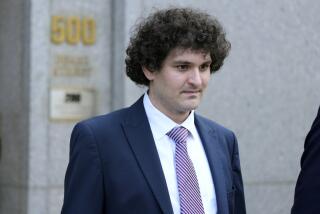Advisor is accused in TARP-related scheme
In the first criminal case related to the banking bailout, a Tennessee financial advisor was accused Wednesday of operating a multimillion-dollar Ponzi scheme that lured investors, in part, by promising that their investments would go into debt backed by the federal government’s $750-billion rescue program.
The prosecution is among the 20 criminal investigations into potential wrongdoing that were disclosed this week by Neal Barofsky, the special inspector general for the Treasury Department’s Troubled Asset Relief Program, or TARP.
The financial advisor, Gordon B. Grigg of Franklin, Tenn., described himself as a “life and financial coach” and lured nearly 60 investors to his ProTrust Management Group since 1990, according to a federal complaint filed in U.S. District Court in Nashville.
Grigg stole about $5 million from clients, according to the complaint. Although none of that money came from TARP funds, Barofsky has said he intends to pursue schemes that defraud investors under the name of the bailout even when they don’t involve the loss of public money.
Grigg made phony claims that investors’ money was being put into “TARP-guaranteed debt” with a 12.5% return.
“There is no such thing as TARP-guaranteed debt,” a Treasury Department spokeswoman said Tuesday.
Grigg’s attorney, Mark Pickrell, said Wednesday afternoon that his client had tentatively agreed with prosecutors to plead guilty to four counts of mail fraud and four counts of wire fraud.
“Mr. Grigg is remorseful for his actions, and he faces up to eight years’ imprisonment for this fraud under the federal sentencing guidelines,” Pickrell said.
John K. Webb, the white-collar crime chief for the Tennessee federal prosecutor, said that his office would be looking for TARP angles in any financial fraud case.
Investors were led to believe that Grigg had special relationships with big names on Wall Street, including Berkshire Hathaway Inc., Goldman Sachs Group Inc. and Morgan Stanley. Grigg used counterfeit letterheads and forged signatures of national investment firm executives to mislead investors, the complaint charges.
Details of his scheme were released at a news conference in Nashville attended by Edward M. Yarbrough, the U.S. attorney in Nashville, and Barofsky.
The Treasury Department said Wednesday that it had extensive protections to defend TARP against fraud, disputing allegations that the program is affected by criminal activity.
“We commend Special Inspector Gen. Barofsky for taking these early steps to head off bad actors that may seek to exploit these programs for personal gain,” said department spokeswoman Jenni R. Engebretsen.
--
ralph.vartabedian@latimes.com







